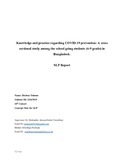Knowledge and practice regarding Covid-19 prevention: a cross sectional study among the school going students (6-9 grade) in Bangladesh
Abstract
Background
Coronavirus disease (COVID-19) is a global pandemic which is caused by severe acute
respiratory syndrome coronavirus-2 (SARS-CoV-2). Sufficient and appropriate knowledge
towards COVID-19 is significant in prevention and control of the pandemic. The level of
knowledge varies from individual to individual and also depends on the geographical distribution
of the people. There is significant association between the poor knowledge and practices of
pandemic control strategies in low middle income countries. Thus, knowledge influences the
control and prevention of COVID-19 pandemic.
Methods
This survey was conducted in 9 schools of Cox’s bazar and Pekua, Bangladesh. There were a
total of 1973 participants. The study includes students aged >=10 years of age resing in Cox’s
bazar and Pekua. Convenient sampling approach was used to recruit the participants. It is a cross
sectional study. Descriptive analysis, frequency and percentage and primary dataset were used
for data analysis. The ethical clearance was obtained from the Institutional Review Board (IRB)
of BRAC JPGSPH, BRAC University.
Results
This survey was conducted in 9 schools of Cox’s bazar and Pekua, Bangladesh. There were a
total of 1973 participants. Most of the participants were aware of the mode of transmissions and
preventive methods towards COVID-19 pandemic. Majority of the participants were female
(59%, n=1173) and completed high school (46%). As for the mode of transmission more than
50% of the participants living in Cox’s bazar and Pekua knew that COVID-19 transmission
happens when a person come in contact with the breath of an infected person, when an infected
person talks in front and close to a non-infected person, through droplets from coughing and
sneezing, and through touching eyes, mouth and ear with unclean hands. As for the prevention
methods towards COVID-19, majority of the participants from Cox’s bazar and Pekua were
aware that wearing mask prevents the COVID-19, washing hand, and covering mouth when
sneezing, maintaining at least 3 ft distance from each other avoiding touching nose, ears and
eyes, staying in home isolation when have even mild symptoms, and vaccination.
Conclusion
Majority of the participants have adequate knowledge on mode of transmission, however, less
than 50% from both Cox’s bazar and Pekua have reported that avoidance of crowded places is
not required for the prevention of infection. As for the mode of transmission, the majority of the
participants from both Cox’s bazar and Pekua were not aware that the infection can be
transmitted through air. Thus, there is further need for health education to enhance the
knowledge of prevention towards COVID-19.

